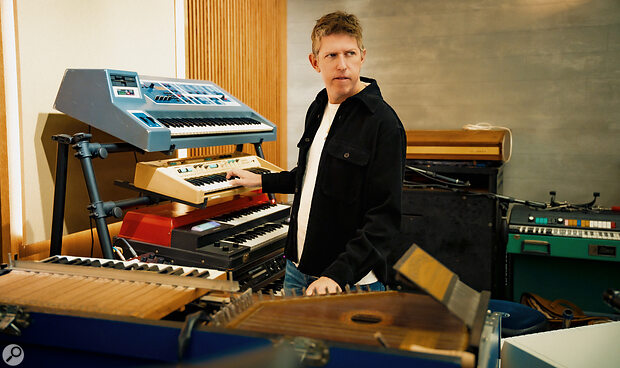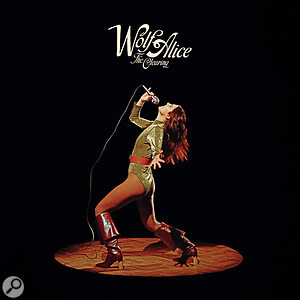 Super-producer Greg Kurstin.Photo: Brantley Gutierrez
Super-producer Greg Kurstin.Photo: Brantley Gutierrez
For their first major‑label release, Wolf Alice hired super‑producer Greg Kurstin to channel their inspiration.
“I came from indie music and jazz, but had my biggest breaks in pop,” smiles Greg Kurstin. “I’m fine with that. It doesn’t matter who it is or what the genre is, a good song is a good song, whether by David Bowie, Talking Heads, the Beatles or the Ramones. I’ve always been a sucker for a good pop song, so my tendency is to go there.
“I’ve had contrasts going on all my life. I started out playing guitar in post‑punk bands, but also played jazz piano. When I was 15, I discovered Mingus, Coltrane, Miles and hard‑bop, and got heavily into that. It took over my life. I was planning to become a jazz musician! Then, in the early ’90s, I accidentally got signed to David Byrne’s label Luaka Bop, with the indie band Geggy Tah. I learned how to write, produce and program, using drum machines, samples and sequencers. Afterwards I became a side musician with Beck and the Flaming Lips, still operating in the alternative rock world. Eventually, in the early 2000s, I decided that I wanted to be a songwriter and producer, but at that time, the only people who needed songwriters were pop singers, because indie bands were self‑sufficient.
“But I also do weird music. So I move around a lot in different genres. As a producer, with any project I’m working on, I don’t want to put my stamp on it so people could say ‘That’s a Greg Kurstin production.’ Instead I’m trying to help an artist or a band achieve what they’re trying to do, in the best possible way. That’s the goal.”
As a producer, with any project I’m working on, I don’t want to put my stamp on it so people could say ‘That’s a Greg Kurstin production.’ Instead I’m trying to help an artist or a band achieve what they’re trying to do, in the best possible way.
Following hits with Lily Allen, Adele, Sia, Kelly Clarkson, Pink, Lady Gaga, Beyoncé and many others, the latest act to benefit from Greg Kurstin’s broad experience is rock band Wolf Alice, whose fourth album The Clearing is their first on a major label.
 The Clearing is Wolf Alice’s first album on a major label.“Wolf Alice were probably attracted to my range,” says Kurstin. “They know who they are, as a band, so they don’t need someone who is too much like them. They wanted someone who could help them expand their sound. They don’t want to be labelled as a rock band. They went into different territory with their new record, and I really appreciated that. I was excited to learn with them, and to figure out with them how to get the sounds that they were going for. That was the fun part of this record, because I don’t think I’ve made this kind of record with anyone yet. It was a little bit dangerous, for all of us, because we’re all trying to figure it out. That’s very exciting in the record‑making process!”
The Clearing is Wolf Alice’s first album on a major label.“Wolf Alice were probably attracted to my range,” says Kurstin. “They know who they are, as a band, so they don’t need someone who is too much like them. They wanted someone who could help them expand their sound. They don’t want to be labelled as a rock band. They went into different territory with their new record, and I really appreciated that. I was excited to learn with them, and to figure out with them how to get the sounds that they were going for. That was the fun part of this record, because I don’t think I’ve made this kind of record with anyone yet. It was a little bit dangerous, for all of us, because we’re all trying to figure it out. That’s very exciting in the record‑making process!”
Organic Mood
“When I first met them, they told me that they wanted to track as a band, with at least the rhythm section playing together and if possible more. Sonically, they wanted to do something very organic. Joff [Oddie, guitarist] said he wanted to hear the wood of the instruments. So there are many acoustic instruments on the album, like upright bass, acoustic guitar, piano, strings and so on. They wanted even the electric guitars to be very warm and not ultra‑processed. There are of course production tricks on the record, but they wanted to focus more on the arrangements.
“I love getting into arrangements, rather than the tricks of the computer or editing and stuff like that, because that’s the jazz part of me. I was saying things like, ‘Let’s work out what everyone’s going to play. What is your part? What is the bass going to do? What is the guitar going to do?’ We were working out the different parts, and trying to arrange the songs in the best possible way. It’s a more ’60s and ’70s approach, perhaps ’80s as well, also with sonic references to those eras. They did not want to make a retro record, but rather to approach the songs in the way that bands might have done in the ’60s or ’70s, and still keep it modern.”
All tracking sessions for The Clearing took place at No Expectations Studio, which is part of Kurstin’s management, record and publishing company of the same name. “Most of the songs were finished before the band arrived. I received demos of the songs, sometimes [singer] Ellie [Roswell]’s Logic demos, sometimes recordings of the band playing together in their rehearsal space. They had done a lot of work rehearsing and arranging these songs together. I would sift through everything, and analyse what the best things were about these demos, and what the best production approach would be for each song.
“I don’t want to take too much credit for the arrangements, as the band and Ellie had many great parts already. Ellie’s demos had a lot of really great gems that we could use arrangement‑wise, and sometimes sonically. So often it was not a matter of coming up with ideas, but more of helping the band recognise what was already great in what they had done. But sometimes they would look to me for parts. I really love getting into bass parts, in a Paul McCartney‑esque way. When I listen to the Beatles, and...
You are reading one of the locked Subscribers-only articles from our latest 5 issues.
You've read 30% of this article for FREE, so to continue reading...
- ✅ Log in - if you have a Digital Subscription you bought from SoundOnSound.com
- ⬇️ Buy & Download this Single Article in PDF format £0.83 GBP$1.49 USD
For less than the price of a coffee, buy now and immediately download to your computer, tablet or mobile. - ⬇️ ⬇️ ⬇️ Buy & Download the FULL ISSUE PDF
Our 'full SOS magazine' for smartphone/tablet/computer. More info... - 📲 Buy a DIGITAL subscription (or 📖 📲 Print + Digital sub)
Instantly unlock ALL Premium web articles! We often release online-only content.
Visit our ShopStore.
